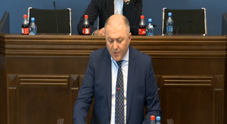
Georgian parliament holds hearing of future head of State Security Service
By Tsotne Pataraia
Thursday, October 17
Grigol Liluashvili, who has been nominated the new head of Georgia’s State Security Service (SSS), says that the main challenge for Georgia is the occupation of Georgian territories by Russia.
On October 16, the Committee on Defense and Security of the Parliament of Georgia held a hearing regarding the candidacy of Grigol Liluashvili nominated for the position of the Head of State Security Service. Liluashvili, who may replace Vakhtang Gomelauri in the role, needs to be approved by parliament as Gomelauri became the interior minister of Georgia in early September.
Speaking at a parliamentary committee meeting, Liluashvili named Russian occupation as the main challenge for the country. He told MPs that Russia’s illegal activities at the occupation lines aim to “make influence not only on Georgia but also on the international community.”
According to Liluashvili, Russia operates in Georgia with five major instruments of hybrid warfare: occupation forces and de facto regimes, information warfare, soft power, economic expansion and covert operations.
He stated that the occupation of Georgian territories is one of the important tools of the Russian-made hybrid war in Georgia. According to him, the situation there and along the occupation line is quite difficult and one of the main directions of the SSS's activities is to maintain fragile but manageable stability on the ground:
"Russian armed forces illegally stationed in occupied Abkhazia and the Tskhinvali region and their special services represent a significant challenge to our country," said Liluashvili.
He stated that the occupation of 20 percent of Georgian land is an important lever for Russia in its hybrid war against Georgia, which is being used is used to get involved in Georgia’s internal issues and attempt to spark ethnic, religious or other conflicts.
He also added that recent developments at the occupation line with Tskhinvali (the opening of so-called police posts on Tbilisi administered territory and the closure of so-called borders) and the cases related to the murder of Georgian citizens Archil Tatunashvili, Giga Otkhozoria, David Basharuli and Irakli Kvaratskhelia “have confirmed the Russian goals.”
Following the nominee, the State Security Service, with the help of international partners - the EU Monitoring Mission, the OSCE and the UN - continues to work on the ground to maintain peace and stability. However, Liluashvili acknowledges that the work is not very effective because of the Russian and de facto authorities' ultimatums and threatening tone, the “Incident Prevention, and Response Mechanism” and the Geneva meetings being largely ineffective.
Liluashvili also highlighted the economic leverage Russia uses to facilitate Georgia's development:
“The ongoing conflicts, the crawling process of “Borderisation” are not just steps towards the seizure of Georgian lands, these are steps to weaken the country's economy, reduce the country's chances of joining the Euro-Atlantic community,” stated Liluashvili.
Speaking on other topics Liluashvili emphasized the fact that the actions carried out by SSS have led to a “significant decrease in supporters of terrorist organisations in Georgia.” Liluashvili noted that the State Security Service has minimized foreign terrorists' attempts to transit the country by fighters and terrorists:
"Against the background of unprecedented terrorist activity around the world, the State Security Service has greatly reduced the number of potential supporters of international terrorist organizations in Georgia and their impacts with the help of international partners and minimized foreign terrorism,” said he.
Liluashvili also touched upon cybersecurity issues and noted that one of the priority directions in this regard is the regulation of the powers of the State Security Service in the field of cybersecurity. He underlined the importance of covert operations and threats in this direction, coming not only from Russia but also from other countries, forming garments both inside and outside the country.
The Prime Minister nominated Grigol Liluashvili's candidacy for the post of the head of the GPU on October 7. Liluashvili is associated with the head of the ruling party “Georgian Dream” Bidzina Ivanishvili. From 2015-2016 Liluashvili was Chairman and General Director of “Cartu Group” (founded by Ivanishvili) supervisory board and chairman of “Cartu Bank”. He worked in Tbilisi City Hall for seven months since January 2016 a deputy mayor and then became a member of Parliament. Liluashvili left parliament in 2017, after being appointed as deputy chief of the State Security Service.


